6 June 2025
Weekly Market View
Focus on the ‘hard’ data
Global equities broke out into a record high this week, more than recovering the ground lost since President Trump launched – and then scaled back – his ‘Liberation Day’ tariffs.
Although trade tensions have resurfaced, concerns about an all-out trade war have eased, especially after this week’s call between Trump and China’s President Xi.
The upcoming “hard” data for May, in the form of US non-farm payrolls and inflation, will provide the first sign of the impact of US tariffs on real economic activity. Softer US employment and stable inflation could revive Fed rate cut expectations, potentially driving US equities to a new high.
We also see further upside in China equities within Asia ex-Japan on potential earnings upgrades, fiscal stimulus and flows into Emerging Markets.
Meanwhile, we turn bearish on EUR/JPY as renewed Euro area disinflation trend raises the risk of more ECB rate cuts in H2.
The US tax bill is net earnings positive: add US equities, especially in growth sectors
Payment deferral by HK developer is idiosyncratic: Asia USD bonds are core holding
Diverging inflation and policy trends between Euro area and Japan: bearish EUR/JPY
Charts of the week: All-time high
The global equity index rose to a record high; we expect US stocks to follow as soft data leads to Fed rate cuts
MSCI All Country World, US and Europe total return indices*
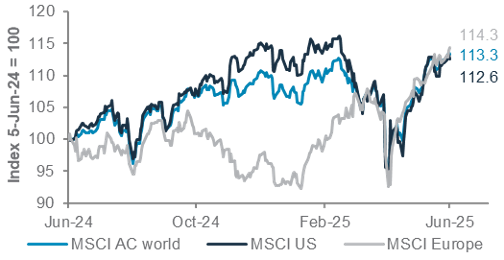
US private sector payrolls, ISM manufacturing & services PMIs
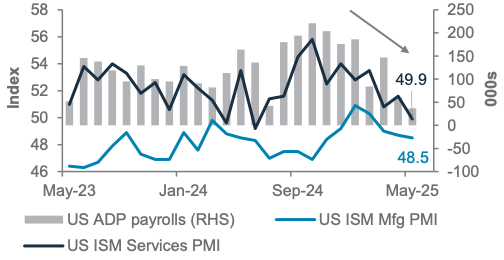
Source: Bloomberg, Standard Chartered; *Indices rebased to 100 = 5 June 2024
Editorial
Focus on the ‘hard’ data
Global equities (MSCI All Country World Index) broke out into a record high this week. Stocks have more than recovered the ground lost since President Trump launched – and then scaled back – his ‘Liberation Day’ tariffs in early April. Although trade tensions have resurfaced, concerns about an all-out trade war have eased, especially after this week’s call between Trump and China’s President Xi. The upcoming “hard” data for May, in the form of US non-farm payrolls and inflation, will provide the first sign of the impact of US tariffs on real economic activity. Softer US employment and stable inflation could revive Fed rate cut expectations, potentially driving US equities to a new high.
While European equities have led the global rally this year, we expect US equities to catch up. We also see further upside in China equities within Asia ex-Japan on potential earnings upgrades, fiscal stimulus and flows into Emerging Markets. Meanwhile, we turn bearish on EUR/JPY as renewed Euro area disinflation trend raises the risk of more ECB rate cuts in H2.
Trade tensions resurface, then ease. This week, Trump doubled US tariff on steel and aluminium imports to 50%, exempting just the UK, the only market to have signed a preliminary trade pact with the US following ‘Liberation Day’. The US president, facing court challenges against his tariffs and criticism that he has gone soft on trade, could seek other legal grounds to impose targeted tariffs to force trade partners to return to the negotiating table. However, we don’t see an all-out trade war breaking out, especially after the Trump-Xi phone call which sought to reset US-China trade talks. In April, Trump significantly scaled back tariffs after US stocks, bonds and the dollar tanked. Thus, the so-called “Trump put” remains in place.
Weaker “soft” data. While trade tensions simmer in the backburner, US “soft” business confidence indicators (PMIs) have continued to weaken. The US ISM manufacturing PMI for May missed expectations, remaining contractionary. Meanwhile, ISM service sector PMI, particularly new orders
component, turned contractionary for the first time in almost a year, while ‘prices paid’ continued to rise.
Resilient “hard” data. Despite weak “soft” data, the so-called “hard” real activity indicators have remained resilient, likely supporting household consumption. One of the timeliest job market indicators – initial jobless claims – is rising but has averaged around 235,000 in May, well below levels that would signal recessionary conditions (the 2007-09 Great Recession was triggered after US claims rose to around 350,000).
US payrolls, inflation expectations. Against this backdrop, the upcoming employment and inflation reports for May are important drivers for markets. The consensus estimates US net job creation slowed to 126,000 in May. A significant miss in the payrolls data, if followed by a relatively stable inflation data next week (consensus estimate for May core inflation: 2.9% y/y, 0.3% m/m) would raise the prospect of the Fed resuming rate cuts from July. This could potentially drive US equities to a new record high. On the contrary, any tariff-driven surge in inflation would delay rate cuts, leading to a short-term consolidation in equity markets. However, we do not expect a significant pullback as investor positioning in US equities remains bearish.
Watching US budget. Trump’s “Big, beautiful bill’ could potentially upset bond markets if passed in its current form, given soaring deficit projections. We expect cutback to some of the tax incentives. There are some elements of the bill, including tax deductions on R&D, capex and interest expenses, that are net positive for US earnings growth (see page 4).
Bearish on EUR near-term. Continued Euro area disinflation, accentuated by US tariffs, raise the prospect of further ECB rate cuts in H2, following this week’s 25bps cut to 2.0%. Euro area core inflation fell sharply to a three-year low of 2.3%. Meanwhile, we see further appreciation in the JPY amid global growth uncertainty. The BoJ is likely to hike rates further as inflation continues to surprise higher, exceeding its 2% target. We see an opportunity to turn bearish on EUR/JPY (page 6).
The weekly macro balance sheet
Our weekly net assessment: On balance, we see the past week’s data and policy as neutral for risk assets in the near-term
(+) factors: Easing inflation in the US and Euro area; Trump-Xi talks
(-) factors: Weaker US business confidence and payrolls data, cautious Fed, higher US sectoral tariff
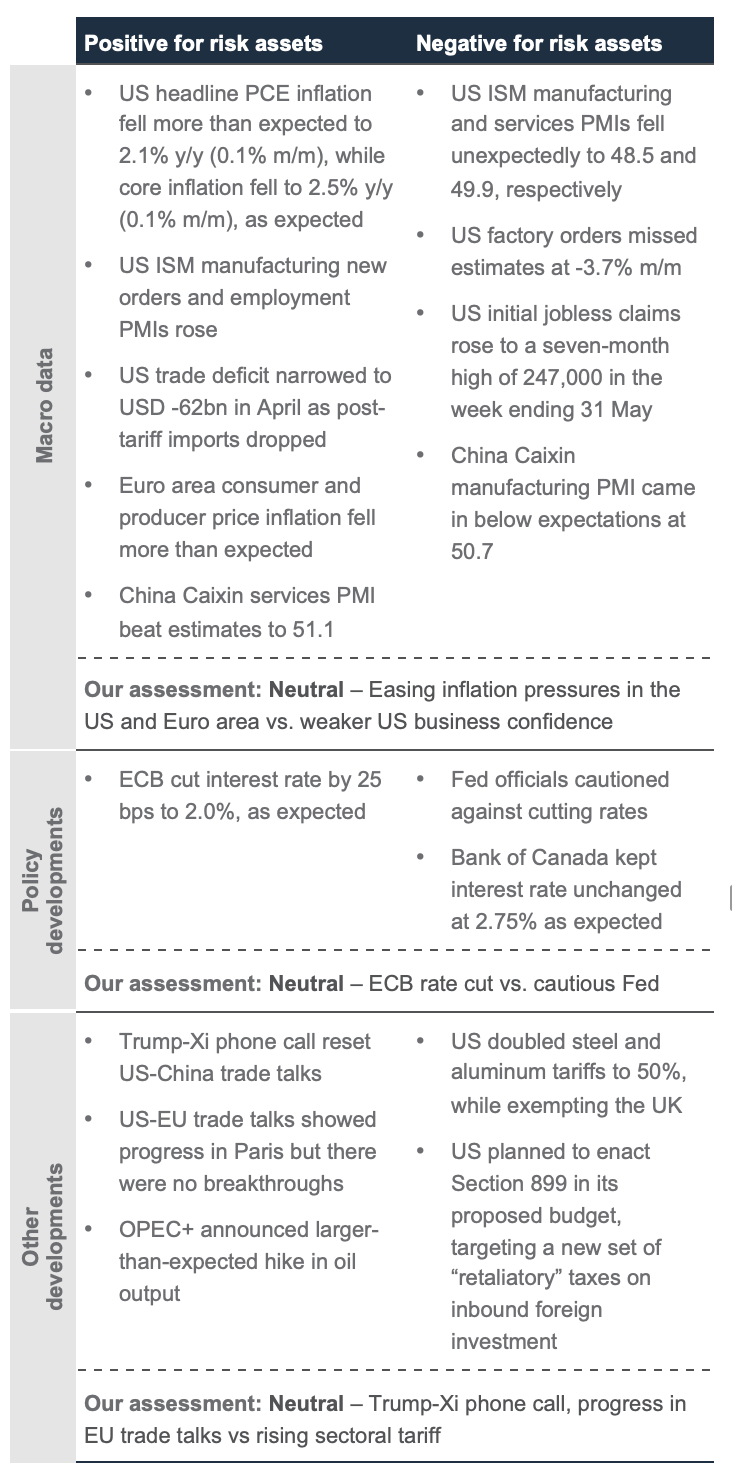
US ISM service sector ‘prices paid’ index rose to the highest level since November 2022, while new orders fell in May, below market expectations
US ISM services PMI for new orders and price paid
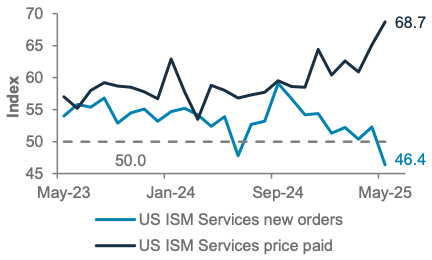
Euro area core and headline inflation fell more than expected in May
Euro area core and headline inflation
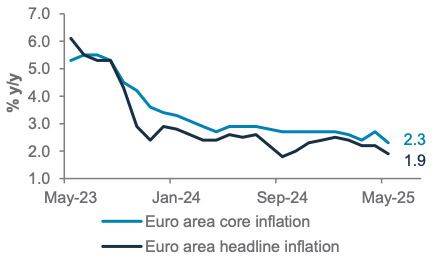
China’s Caixin manufacturing PMI fell below the neutral 50.0 mark for the first time in eight months, while services PMI was slightly above expectation
China Caixin manufacturing and service PMIs
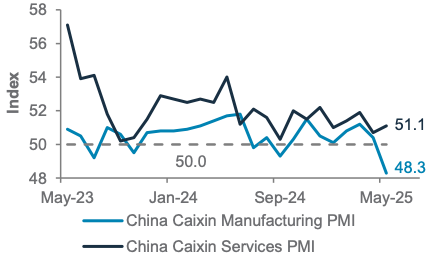
Top client questions
What are the key takeaways from the HK/China earnings season?
Our view: We are bullish on China equities over a 12-month horizon, especially favouring the Hang Seng Tech index. This is backed by robust earnings projections across growth sectors.
Rationale: Over 95% of companies in the MSCI China index have reported their Q1 earnings. In recent weeks, consensus earnings expectations for the MSCI China index in 2025 have been revised lower to 6.3%, reflecting concerns over economic growth and tariff-related policies. However, 2026 projections remain robust at 11.8%. We see further upside to earnings, supported by a few factors:
- Fiscal stimulus, especially helping technology-related investments. Earnings expectations for the Hang Seng Tech index in 2026 have been revised higher to 24.6% (from 21.6% at the start of year), while valuations remain attractive, with 12m forward P/E at 16.5x.
- USD weakness could drive further rotation into EM equity markets, benefitting China equities.
- The latest Trump-Xi call to ease trade tensions could also offer potential tailwinds. While tariff uncertainties persist, progress on US-China trade deals during this 90-day tariff exemption period could support China’s exports and earnings growth.
— Michelle Kam, CFA, Investment Strategist
Earnings growth projections for the MSCI China index for 2026 remains resilient at 11.8%
Earnings growth projections for MSCI China index in 2025 and 2026
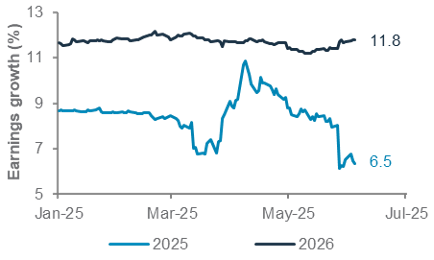
What are the implications of President Trump’s “One Big Beautiful Bill” for US equities?
Our view: Add exposure to US equities, on pullbacks. The tax bill is net-earnings positive, given extension of tax cuts and various tax deductions on R&D, capex and interest expenses.
Rationale: The bill is net-earnings positive. It benefits corporate earnings by extending existing tax cuts, making certain R&D, capex spend, and more interest expense tax deductible, while reducing tax on foreign income. On the flipside, the withdrawal of green energy credits, and other government policies, such as tariffs and immigration restrictions could negatively impact earnings, while concerns about the fiscal deficit could reduce US equity valuation.
Section 899 of the bill implies higher withholding taxes on dividends for some foreign holders of US equities. This might reduce the attractiveness of dividend yielding stocks, relative to non-dividend paying growth stocks. We continue to expect upside in US equities, underpinned by growth sectors: we favour US-listed semiconductor and the technology software sectors. Investor position normalisation and lower market volatility could drive flows back to US equities.
— Fook Hien Yap, Senior Investment Strategist
Growth sectors*, where fundamentals are robust, dominate the US equity market. High-dividend sectors carry less weight
Consensus 12m forward dividend yield of MSCI US sectors**. Horizontal lines for dividend yield of MSCI All Country World and MSCI US indices
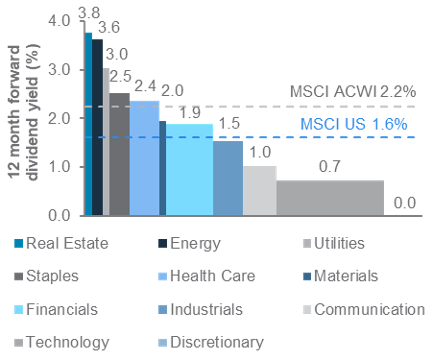
* Technology, communication; **Width of the column represents the sector’s weight within MSCI US
Top client questions (cont’d)
Will rising long-term Japanese government bond yields hurt Japanese insurers?
Our view: Add Japanese insurer bonds on weakness. The impact of rising bond yields on solvency and profitability is not material due to Japanese accounting principles governing the treatment of domestic bond holdings.
Rationale: Reports indicate that Japanese insurers have been purchasing longer-dated Japanese government bonds (JGBs) and these investments in JGBs pose risks to their financial position due to rising bond yields. We note the increase in JGB yields has led to significant unrealized losses. However, these have been partially offset by substantial unrealized gains in insurers’ equity portfolios accumulated over the years.
From an accounting perspective, insurers’ liabilities typically have longer duration than their assets. Consequently, an increase in interest rates would reduce the present value of these liabilities, potentially leading to mark-to-market gains and increase in shareholders’ equity. However, most Japanese insurers recognize their yen-denominated liabilities and bond holdings at book value using the amortized cost method under Japanese accounting principles, which minimizes the impact of fluctuating JGB yields on their capitalization and earnings.
Furthermore, insurance liabilities are more stable than bank deposits, lowering the likelihood of forced asset sales during periods of market stress. Insurers also tend not to use leverage in their investment portfolios, further reducing the risk of disorderly selling in JGBs.
— Ray Heung, Senior Investment Strategist
We do not expect material impact on the credit metrics of Japan’s insurers from rising long-dated Japanese government bond yields
10-, 20- and 30-year Japan government bonds yields
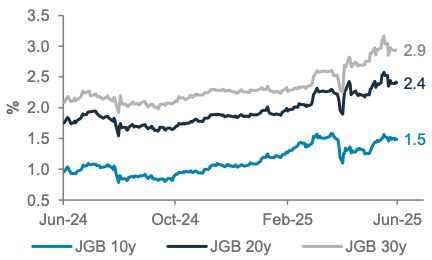
Does the decision by a key Hong Kong property developer to delay its coupon payment impact Asia USD bonds?
Our view: Asian USD bonds remain a core holding. The payment deferral by a Hong Kong property developer is an idiosyncratic event.
Rationale: The decision by a Hong Kong developer to defer coupon payment has led to a markdown in the developer’s perpetual bonds. Perpetual bonds from other Hong Kong property developers have also dropped, in sympathy.
We believe this negative price reaction is primarily linked to the specific liquidity issues of this particular developer, and the spillover impact is not going to significantly affect other Asian bonds. Most other Hong Kong developers are rated investment grade and have stronger credit metrics compared to the developer in question. Lastly, the total weight of Hong Kong property developers’ bonds in the Asia Bond Index is low, at 1.4%.
— Ray Heung, Senior Investment Strategist
The deferral of a perpetual coupon payment by a HK property developer should have limited impact on Asian USD bonds
Asia USD bond index performance (6 June 2024 = 100)
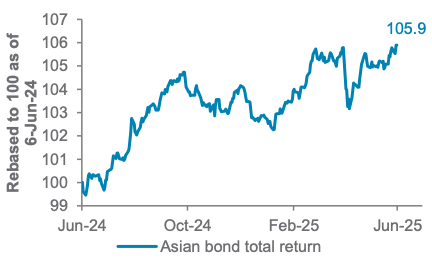
Top client questions (cont’d)
What is the outlook for the EUR following the latest ECB meeting?
Our view: We are bearish on EUR/JPY amid diverging inflation and policy rate trends between the Euro area and Japan.
Rationale: This week, the ECB cut its deposit rate by 25bps to 2.0% as expected. The ECB also revised its inflation forecasts for 2025 lower to 2%, from 2.3% in March. For 2026, the average increase in consumer prices is projected at 1.6% (previously 1.9%), and for 2027, the ECB maintained its inflation forecast of 2%. Against this disinflationary backdrop, we see risks of further policy easing in H2, especially if the US reinstates reciprocal tariffs after the latest pause. We see EUR/USD falling towards 1.1250 (50-day MA) this week.
However, we see more compelling value in a bearish EUR/JPY idea. We see further strength in JPY on safe haven demand due to ongoing trade and global growth uncertainty. We expect the BoJ to continue hiking rates as Japan’s inflation continues to run above its 2% target. Japan’s recent consumer inflation exceeded expectations. Technically, a firm break in the EUR/JPY pair below 162.5 (50-Day MA) can pave the way for a test of 158.3.
— Iris Yuen, Investment Strategist
We expect EUR/JPY downside, with support at 158.3
EUR/JPY and key moving averages
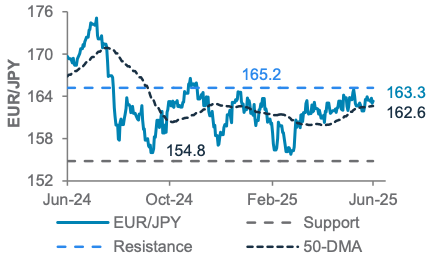
Market performance summary*
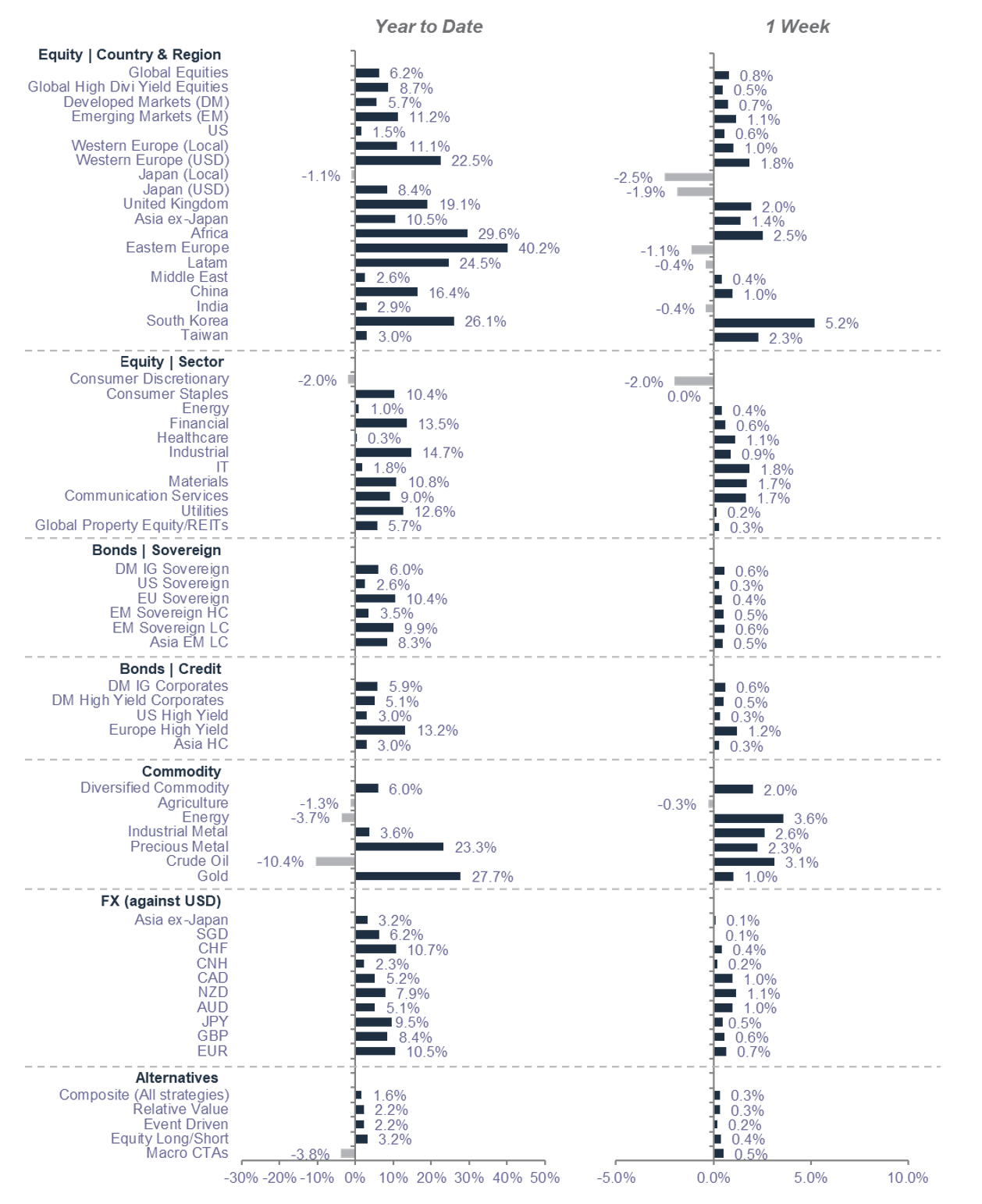
*Performance in USD terms unless otherwise stated, 2025 YTD performance from 31 December 2024 to 5 June 2025; 1-week period: 29 May 2025 to 5 June 2025
Our 12-month asset class views at a glance

Economic and market calendar
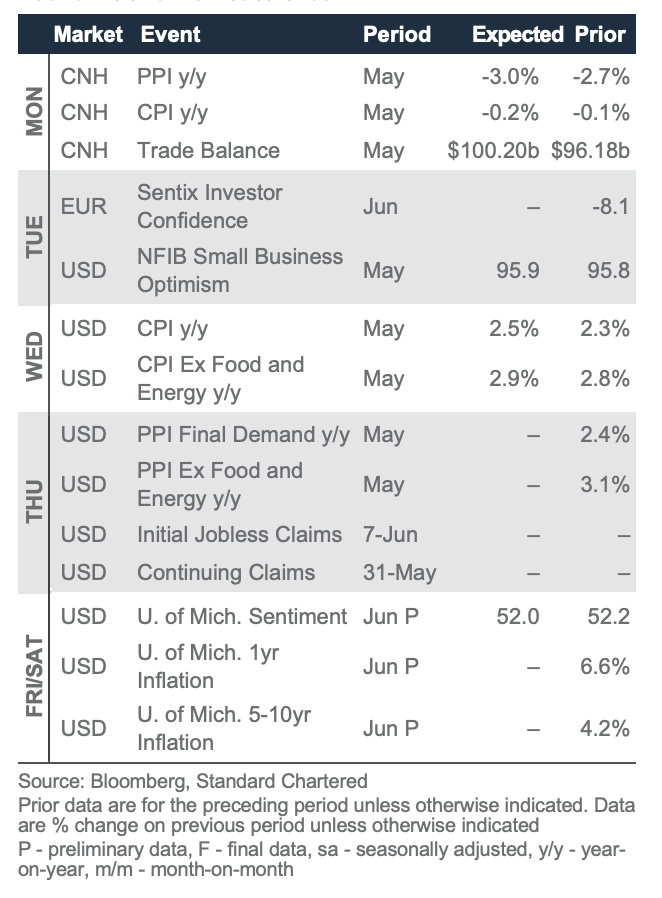
The S&P500 has next interim resistance at 6,100
Technical indicators for key markets as of 5 June close
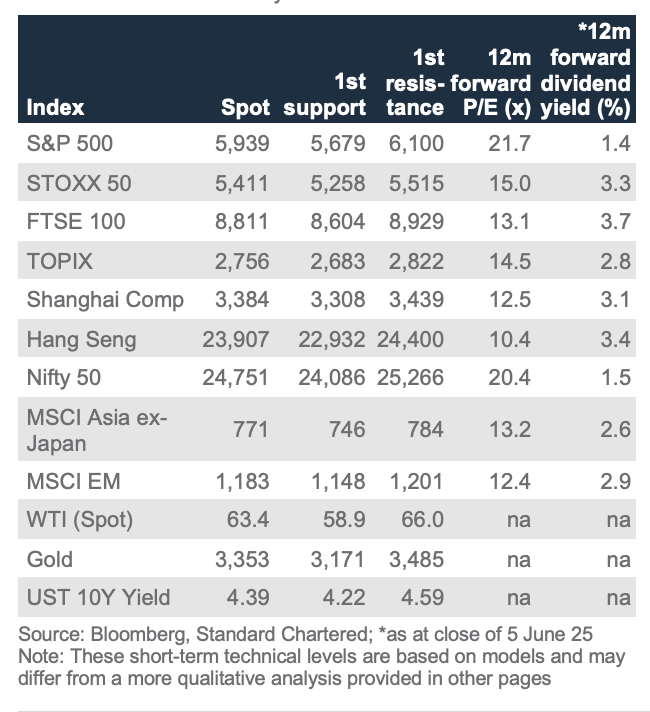
Investor diversity has normalised across asset classes
Our proprietary market diversity indicators as of 5 June close
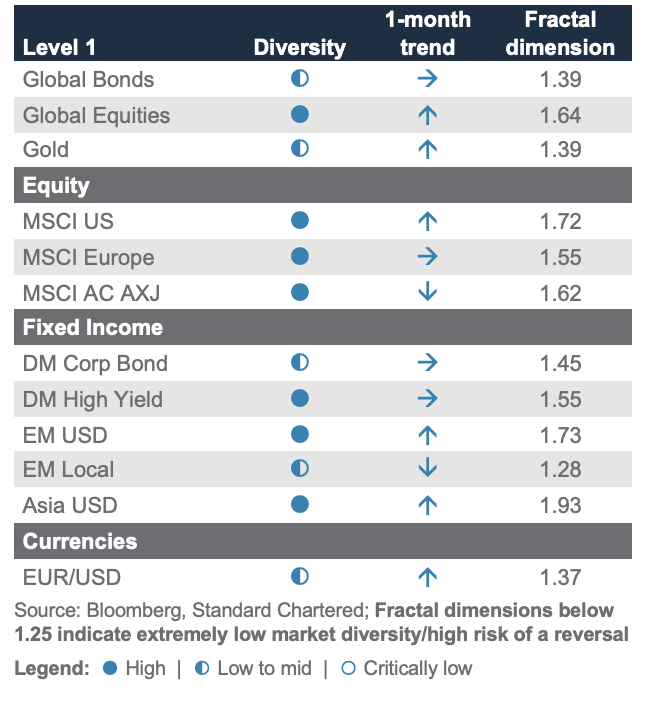

Disclosure
This document is confidential and may also be privileged. If you are not the intended recipient, please destroy all copies and notify the sender immediately. This document is being distributed for general information only and is subject to the relevant disclaimers available at our Standard Chartered website under Regulatory disclosures. It is not and does not constitute research material, independent research, an offer, recommendation or solicitation to enter into any transaction or adopt any hedging, trading or investment strategy, in relation to any securities or other financial instruments. This document is for general evaluation only. It does not take into account the specific investment objectives, financial situation or particular needs of any particular person or class of persons and it has not been prepared for any particular person or class of persons. You should not rely on any contents of this document in making any investment decisions. Before making any investment, you should carefully read the relevant offering documents and seek independent legal, tax and regulatory advice. In particular, we recommend you to seek advice regarding the suitability of the investment product, taking into account your specific investment objectives, financial situation or particular needs, before you make a commitment to purchase the investment product. Opinions, projections and estimates are solely those of SC at the date of this document and subject to change without notice. Past performance is not indicative of future results and no representation or warranty is made regarding future performance. The value of investments, and the income from them, can go down as well as up, and you may not recover the amount of your original investment. You are not certain to make a profit and may lose money. Any forecast contained herein as to likely future movements in rates or prices or likely future events or occurrences constitutes an opinion only and is not indicative of actual future movements in rates or prices or actual future events or occurrences (as the case may be). This document must not be forwarded or otherwise made available to any other person without the express written consent of the Standard Chartered Group (as defined below). Standard Chartered Bank is incorporated in England with limited liability by Royal Charter 1853 Reference Number ZC18. The Principal Office of the Company is situated in England at 1 Basinghall Avenue, London, EC2V 5DD. Standard Chartered Bank is authorised by the Prudential Regulation Authority and regulated by the Financial Conduct Authority and Prudential Regulation Authority. Standard Chartered PLC, the ultimate parent company of Standard Chartered Bank, together with its subsidiaries and affiliates (including each branch or representative office), form the Standard Chartered Group. Standard Chartered Private Bank is the private banking division of Standard Chartered. Private banking activities may be carried out internationally by different legal entities and affiliates within the Standard Chartered Group (each an “SC Group Entity”) according to local regulatory requirements. Not all products and services are provided by all branches, subsidiaries and affiliates within the Standard Chartered Group. Some of the SC Group Entities only act as representatives of Standard Chartered Private Bank and may not be able to offer products and services or offer advice to clients.
Copyright © 2026, Accounting Research & Analytics, LLC d/b/a CFRA (and its affiliates, as applicable). Reproduction of content provided by CFRA in any form is prohibited except with the prior written permission of CFRA. CFRA content is not investment advice and a reference to or observation concerning a security or investment provided in the CFRA SERVICES is not a recommendation to buy, sell or hold such investment or security or make any other investment decisions. The CFRA content contains opinions of CFRA based upon publicly-available information that CFRA believes to be reliable and the opinions are subject to change without notice. This analysis has not been submitted to, nor received approval from, the United States Securities and Exchange Commission or any other regulatory body. While CFRA exercised due care in compiling this analysis, CFRA, ITS THIRD-PARTY SUPPLIERS, AND ALL RELATED ENTITIES SPECIFICALLY DISCLAIM ALL WARRANTIES, EXPRESS OR IMPLIED, INCLUDING, BUT NOT LIMITED TO, ANY WARRANTIES OF MERCHANTABILITY OR FITNESS FOR A PARTICULAR PURPOSE OR USE, to the full extent permitted by law, regarding the accuracy, completeness, or usefulness of this information and assumes no liability with respect to the consequences of relying on this information for investment or other purposes. No content provided by CFRA (including ratings, credit-related analyses and data, valuations, model, software or other application or output therefrom) or any part thereof may be modified, reverse engineered, reproduced or distributed in any form by any means, or stored in a database or retrieval system, without the prior written permission of CFRA, and such content shall not be used for any unlawful or unauthorized purposes. CFRA and any third-party providers, as well as their directors, officers, shareholders, employees or agents do not guarantee the accuracy, completeness, timeliness or availability of such content. In no event shall CFRA, its affiliates, or their third-party suppliers be liable for any direct, indirect, special, or consequential damages, costs, expenses, legal fees, or losses (including lost income or lost profit and opportunity costs) in connection with a subscriber’s, subscriber’s customer’s, or other’s use of CFRA’s content.
Market Abuse Regulation (MAR) Disclaimer
Banking activities may be carried out internationally by different branches, subsidiaries and affiliates within the Standard Chartered Group according to local regulatory requirements. Opinions may contain outright “buy”, “sell”, “hold” or other opinions. The time horizon of this opinion is dependent on prevailing market conditions and there is no planned frequency for updates to the opinion. This opinion is not independent of Standard Chartered Group’s trading strategies or positions. Standard Chartered Group and/or its affiliates or its respective officers, directors, employee benefit programmes or employees, including persons involved in the preparation or issuance of this document may at any time, to the extent permitted by applicable law and/or regulation, be long or short any securities or financial instruments referred to in this document or have material interest in any such securities or related investments. Therefore, it is possible, and you should assume, that Standard Chartered Group has a material interest in one or more of the financial instruments mentioned herein. Please refer to our Standard Chartered website under Regulatory disclosures for more detailed disclosures, including past opinions/ recommendations in the last 12 months and conflict of interests, as well as disclaimers. A covering strategist may have a financial interest in the debt or equity securities of this company/issuer. All covering strategist are licensed to provide investment recommendations under Monetary Authority of Singapore or Hong Kong Monetary Authority. This document must not be forwarded or otherwise made available to any other person without the express written consent of Standard Chartered Group.
Sustainable Investments
Any ESG data used or referred to has been provided by Morningstar, Sustainalytics, MSCI or Bloomberg. Refer to 1) Morningstar website under Sustainable Investing, 2) Sustainalytics website under ESG Risk Ratings, 3) MCSI website under ESG Business Involvement Screening Research and 4) Bloomberg green, social & sustainability bonds guide for more information. The ESG data is as at the date of publication based on data provided, is for informational purpose only and is not warranted to be complete, timely, accurate or suitable for a particular purpose, and it may be subject to change. Sustainable Investments (SI): This refers to funds that have been classified as ‘ESG Intentional Investments – Overall’ by Morningstar. SI funds have explicitly stated in their prospectus and regulatory filings that they either incorporate ESG factors into the investment process or have a thematic focus on the environment, gender diversity, low carbon, renewable energy, water or community development. For equity, it refers to shares/stocks issued by companies with Sustainalytics ESG Risk Rating of Low/Negligible. For bonds, it refers to debt instruments issued by issuers with Sustainalytics ESG Risk Rating of Low/Negligible, and/or those being certified green, social, sustainable bonds by Bloomberg. For structured products, it refers to products that are issued by any issuer who has a Sustainable Finance framework that aligns with Standard Chartered’s Green and Sustainable Product Framework, with underlying assets that are part of the Sustainable Investment universe or separately approved by Standard Chartered’s Sustainable Finance Governance Committee. Sustainalytics ESG risk ratings shown are factual and are not an indicator that the product is classified or marketed as “green”, “sustainable” or similar under any particular classification system or framework.
Country/Market Specific Disclosures
Bahrain: This document is being distributed in Bahrain by Standard Chartered Bank, Bahrain Branch, having its address at P.O. 29, Manama, Kingdom of Bahrain, is a branch of Standard Chartered Bank and is licensed by the Central Bank of Bahrain as a conventional retail bank. Botswana: This document is being distributed in Botswana by, and is attributable to, Standard Chartered Bank Botswana Limited which is a financial institution licensed under the Section 6 of the Banking Act CAP 46.04 and is listed in the Botswana Stock Exchange. Brunei Darussalam: This document is being distributed in Brunei Darussalam by, and is attributable to, Standard Chartered Bank (Brunei Branch) | Registration Number RFC/61 and Standard Chartered Securities (B) Sdn Bhd | Registration Number RC20001003. Standard Chartered Bank is incorporated in England with limited liability by Royal Charter 1853 Reference Number ZC18. Standard Chartered Securities (B) Sdn Bhd is a limited liability company registered with the Registry of Companies with Registration Number RC20001003 and licensed by Brunei Darussalam Central Bank as a Capital Markets Service License Holder with License Number BDCB/R/CMU/S3-CL and it is authorised to conduct Islamic investment business through an Islamic window. China Mainland: This document is being distributed in China by, and is attributable to, Standard Chartered Bank (China) Limited which is mainly regulated by National Financial Regulatory Administration (NFRA), State Administration of Foreign Exchange (SAFE), and People’s Bank of China (PBOC). Hong Kong: In Hong Kong, this document, except for any portion advising on or facilitating any decision on futures contracts trading, is distributed by Standard Chartered Bank (Hong Kong) Limited (“SCBHK”), a subsidiary of Standard Chartered PLC. SCBHK has its registered address at 32/F, Standard Chartered Bank Building, 4-4A Des Voeux Road Central, Hong Kong and is regulated by the Hong Kong Monetary Authority and registered with the Securities and Futures Commission (“SFC”) to carry on Type 1 (dealing in securities), Type 4 (advising on securities), Type 6 (advising on corporate finance) and Type 9 (asset management) regulated activity under the Securities and Futures Ordinance (Cap. 571) (“SFO”) (CE No. AJI614). The contents of this document have not been reviewed by any regulatory authority in Hong Kong and you are advised to exercise caution in relation to any offer set out herein. If you are in doubt about any of the contents of this document, you should obtain independent professional advice. Any product named herein may not be offered or sold in Hong Kong by means of any document at any time other than to “professional investors” as defined in the SFO and any rules made under that ordinance. In addition, this document may not be issued or possessed for the purposes of issue, whether in Hong Kong or elsewhere, and any interests may not be disposed of, to any person unless such person is outside Hong Kong or is a “professional investor” as defined in the SFO and any rules made under that ordinance, or as otherwise may be permitted by that ordinance. In Hong Kong, Standard Chartered Private Bank is the private banking division of SCBHK, a subsidiary of Standard Chartered PLC. Ghana: Standard Chartered Bank Ghana Limited accepts no liability and will not be liable for any loss or damage arising directly or indirectly (including special, incidental or consequential loss or damage) from your use of these documents. Past performance is not indicative of future results and no representation or warranty is made regarding future performance. You should seek advice from a financial adviser on the suitability of an investment for you, taking into account these factors before making a commitment to invest in an investment. To unsubscribe from receiving further updates, please send an email to feedback.ghana@sc.com. Please do not reply to this email. Call our Priority Banking on 0302610750 for any questions or service queries. You are advised not to send any confidential and/or important information to Standard Chartered via e-mail, as Standard Chartered makes no representations or warranties as to the security or accuracy of any information transmitted via e-mail. Standard Chartered shall not be responsible for any loss or damage suffered by you arising from your decision to use e-mail to communicate with the Bank. India: This document is being distributed in India by Standard Chartered in its capacity as a distributor of mutual funds and referrer of any other third party financial products. Standard Chartered does not offer any ‘Investment Advice’ as defined in the Securities and Exchange Board of India (Investment Advisers) Regulations, 2013 or otherwise. Services/products related securities business offered by Standard Charted are not intended for any person, who is a resident of any jurisdiction, the laws of which imposes prohibition on soliciting the securities business in that jurisdiction without going through the registration requirements and/or prohibit the use of any information contained in this document. Indonesia: This document is being distributed in Indonesia by Standard Chartered Bank, Indonesia branch, which is a financial institution licensed and supervised by Otoritas Jasa Keuangan (Financial Service Authority) and Bank Indonesia. Jersey: In Jersey, Standard Chartered Private Bank is the Registered Business Name of the Jersey Branch of Standard Chartered Bank. The Jersey Branch of Standard Chartered Bank is regulated by the Jersey Financial Services Commission. Copies of the latest audited accounts of Standard Chartered Bank are available from its principal place of business in Jersey: PO Box 80, 15 Castle Street, St Helier, Jersey JE4 8PT. Standard Chartered Bank is incorporated in England with limited liability by Royal Charter in 1853 Reference Number ZC 18. The Principal Office of the Company is situated in England at 1 Basinghall Avenue, London, EC2V 5DD. Standard Chartered Bank is authorised by the Prudential Regulation Authority and regulated by the Financial Conduct Authority and Prudential Regulation Authority. The Jersey Branch of Standard Chartered Bank is also an authorised financial services provider under license number 44946 issued by the Financial Sector Conduct Authority of the Republic of South Africa. Jersey is not part of the United Kingdom and all business transacted with Standard Chartered Bank, Jersey Branch and other SC Group Entity outside of the United Kingdom, are not subject to some or any of the investor protection and compensation schemes available under United Kingdom law. Kenya: This document is being distributed in Kenya by and is attributable to Standard Chartered Bank Kenya Limited. Investment Products and Services are distributed by Standard Chartered Investment Services Limited, a wholly owned subsidiary of Standard Chartered Bank Kenya Limited that is licensed by the Capital Markets Authority in Kenya, as a Fund Manager. Standard Chartered Bank Kenya Limited is regulated by the Central Bank of Kenya. Malaysia: This document is being distributed in Malaysia by Standard Chartered Bank Malaysia Berhad (“SCBMB”). Recipients in Malaysia should contact SCBMB in relation to any matters arising from, or in connection with, this document. This document has not been reviewed by the Securities Commission Malaysia. The product lodgement, registration, submission or approval by the Securities Commission of Malaysia does not amount to nor indicate recommendation or endorsement of the product, service or promotional activity. Investment products are not deposits and are not obligations of, not guaranteed by, and not protected by SCBMB or any of the affiliates or subsidiaries, or by Perbadanan Insurans Deposit Malaysia, any government or insurance agency. Investment products are subject to investment risks, including the possible loss of the principal amount invested. SCBMB expressly disclaim any liability and responsibility for any loss arising directly or indirectly (including special, incidental or consequential loss or damage) arising from the financial losses of the Investment Products due to market condition. Nigeria: This document is being distributed in Nigeria by Standard Chartered Bank Nigeria Limited (SCB Nigeria), a bank duly licensed and regulated by the Central Bank of Nigeria. SCB Nigeria accepts no liability for any loss or damage arising directly or indirectly (including special, incidental or consequential loss or damage) from your use of these documents. You should seek advice from a financial adviser on the suitability of an investment for you, taking into account these factors before making a commitment to invest in an investment. To unsubscribe from receiving further updates, please send an email to clientcare.ng@sc.com requesting to be removed from our mailing list. Please do not reply to this email. Call our Priority Banking on 02 012772514 for any questions or service queries. SCB Nigeria shall not be responsible for any loss or damage arising from your decision to send confidential and/or important information to Standard Chartered via e-mail. SCB Nigeria makes no representations or warranties as to the security or accuracy of any information transmitted via e-mail. Pakistan: This document is being distributed in Pakistan by, and attributable to Standard Chartered Bank (Pakistan) Limited having its registered office at PO Box 5556, I.I Chundrigar Road Karachi, which is a banking company registered with State Bank of Pakistan under Banking Companies Ordinance 1962 and is also having licensed issued by Securities & Exchange Commission of Pakistan for Security Advisors. Standard Chartered Bank (Pakistan) Limited acts as a distributor of mutual funds and referrer of other third-party financial products. Singapore: This document is being distributed in Singapore by, and is attributable to, Standard Chartered Bank (Singapore) Limited (Registration No. 201224747C/ GST Group Registration No. MR-8500053-0, “SCBSL”). Recipients in Singapore should contact SCBSL in relation to any matters arising from, or in connection with, this document. SCBSL is an indirect wholly owned subsidiary of Standard Chartered Bank and is licensed to conduct banking business in Singapore under the Singapore Banking Act, 1970. Standard Chartered Private Bank is the private banking division of SCBSL. IN RELATION TO ANY SECURITY OR SECURITIES-BASED DERIVATIVES CONTRACT REFERRED TO IN THIS DOCUMENT, THIS DOCUMENT, TOGETHER WITH THE ISSUER DOCUMENTATION, SHALL BE DEEMED AN INFORMATION MEMORANDUM (AS DEFINED IN SECTION 275 OF THE SECURITIES AND FUTURES ACT, 2001 (“SFA”)). THIS DOCUMENT IS INTENDED FOR DISTRIBUTION TO ACCREDITED INVESTORS, AS DEFINED IN SECTION 4A(1)(a) OF THE SFA, OR ON THE BASIS THAT THE SECURITY OR SECURITIES-BASED DERIVATIVES CONTRACT MAY ONLY BE ACQUIRED AT A CONSIDERATION OF NOT LESS THAN S$200,000 (OR ITS EQUIVALENT IN A FOREIGN CURRENCY) FOR EACH TRANSACTION. Further, in relation to any security or securities-based derivatives contract, neither this document nor the Issuer Documentation has been registered as a prospectus with the Monetary Authority of Singapore under the SFA. Accordingly, this document and any other document or material in connection with the offer or sale, or invitation for subscription or purchase, of the product may not be circulated or distributed, nor may the product be offered or sold, or be made the subject of an invitation for subscription or purchase, whether directly or indirectly, to persons other than a relevant person pursuant to section 275(1) of the SFA, or any person pursuant to section 275(1A) of the SFA, and in accordance with the conditions specified in section 275 of the SFA, or pursuant to, and in accordance with the conditions of, any other applicable provision of the SFA. In relation to any collective investment schemes referred to in this document, this document is for general information purposes only and is not an offering document or prospectus (as defined in the SFA). This document is not, nor is it intended to be (i) an offer or solicitation of an offer to buy or sell any capital markets product; or (ii) an advertisement of an offer or intended offer of any capital markets product. Deposit Insurance Scheme: Singapore dollar deposits of non-bank depositors are insured by the Singapore Deposit Insurance Corporation, for up to S$100,000 in aggregate per depositor per Scheme member by law. Foreign currency deposits, dual currency investments, structured deposits and other investment products are not insured. This advertisement has not been reviewed by the Monetary Authority of Singapore. Taiwan: SC Group Entity or Standard Chartered Bank (Taiwan) Limited (“SCB (Taiwan)”) may be involved in the financial instruments contained herein or other related financial instruments. The author of this document may have discussed the information contained herein with other employees or agents of SC or SCB (Taiwan). The author and the above-mentioned employees of SC or SCB (Taiwan) may have taken related actions in respect of the information involved (including communication with customers of SC or SCB (Taiwan) as to the information contained herein). The opinions contained in this document may change, or differ from the opinions of employees of SC or SCB (Taiwan). SC and SCB (Taiwan) will not provide any notice of any changes to or differences between the above-mentioned opinions. This document may cover companies with which SC or SCB (Taiwan) seeks to do business at times and issuers of financial instruments. Therefore, investors should understand that the information contained herein may serve as specific purposes as a result of conflict of interests of SC or SCB (Taiwan). SC, SCB (Taiwan), the employees (including those who have discussions with the author) or customers of SC or SCB (Taiwan) may have an interest in the products, related financial instruments or related derivative financial products contained herein; invest in those products at various prices and on different market conditions; have different or conflicting interests in those products. The potential impacts include market makers’ related activities, such as dealing, investment, acting as agents, or performing financial or consulting services in relation to any of the products referred to in this document. UAE: DIFC – Standard Chartered Bank is incorporated in England with limited liability by Royal Charter 1853 Reference Number ZC18.The Principal Office of the Company is situated in England at 1 Basinghall Avenue, London, EC2V 5DD. Standard Chartered Bank is authorised by the Prudential Regulation Authority and regulated by the Financial Conduct Authority and Prudential Regulation Authority. Standard Chartered Bank, Dubai International Financial Centre having its offices at Dubai International Financial Centre, Building 1, Gate Precinct, P.O. Box 999, Dubai, UAE is a branch of Standard Chartered Bank and is regulated by the Dubai Financial Services Authority (“DFSA”). This document is intended for use only by Professional Clients and is not directed at Retail Clients as defined by the DFSA Rulebook. In the DIFC we are authorised to provide financial services only to clients who qualify as Professional Clients and Market Counterparties and not to Retail Clients. As a Professional Client you will not be given the higher retail client protection and compensation rights and if you use your right to be classified as a Retail Client we will be unable to provide financial services and products to you as we do not hold the required license to undertake such activities. For Islamic transactions, we are acting under the supervision of our Shariah Supervisory Committee. Relevant information on our Shariah Supervisory Committee is currently available on the Standard Chartered Bank website in the Islamic banking section. For residents of the UAE – Standard Chartered UAE (“SC UAE”) is licensed by the Central Bank of the U.A.E. SC UAE is licensed by Securities and Commodities Authority to practice Promotion Activity. SC UAE does not provide financial analysis or consultation services in or into the UAE within the meaning of UAE Securities and Commodities Authority Decision No. 48/r of 2008 concerning financial consultation and financial analysis. Uganda: Our Investment products and services are distributed by Standard Chartered Bank Uganda Limited, which is licensed by the Capital Markets Authority as an investment adviser. United Kingdom: In the UK, Standard Chartered Bank is authorised by the Prudential Regulation Authority and regulated by the Financial Conduct Authority and Prudential Regulation Authority. This communication has been approved by Standard Chartered Bank for the purposes of Section 21 (2) (b) of the United Kingdom’s Financial Services and Markets Act 2000 (“FSMA”) as amended in 2010 and 2012 only. Standard Chartered Bank (trading as Standard Chartered Private Bank) is also an authorised financial services provider (license number 45747) in terms of the South African Financial Advisory and Intermediary Services Act, 2002. The Materials have not been prepared in accordance with UK legal requirements designed to promote the independence of investment research, and that it is not subject to any prohibition on dealing ahead of the dissemination of investment research. Vietnam: This document is being distributed in Vietnam by, and is attributable to, Standard Chartered Bank (Vietnam) Limited which is mainly regulated by State Bank of Vietnam (SBV). Recipients in Vietnam should contact Standard Chartered Bank (Vietnam) Limited for any queries regarding any content of this document. Zambia: This document is distributed by Standard Chartered Bank Zambia Plc, a company incorporated in Zambia and registered as a commercial bank and licensed by the Bank of Zambia under the Banking and Financial Services Act Chapter 387 of the Laws of Zambia.
